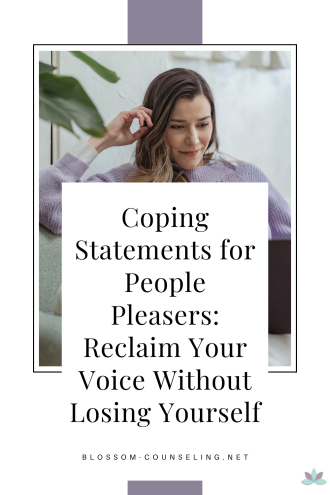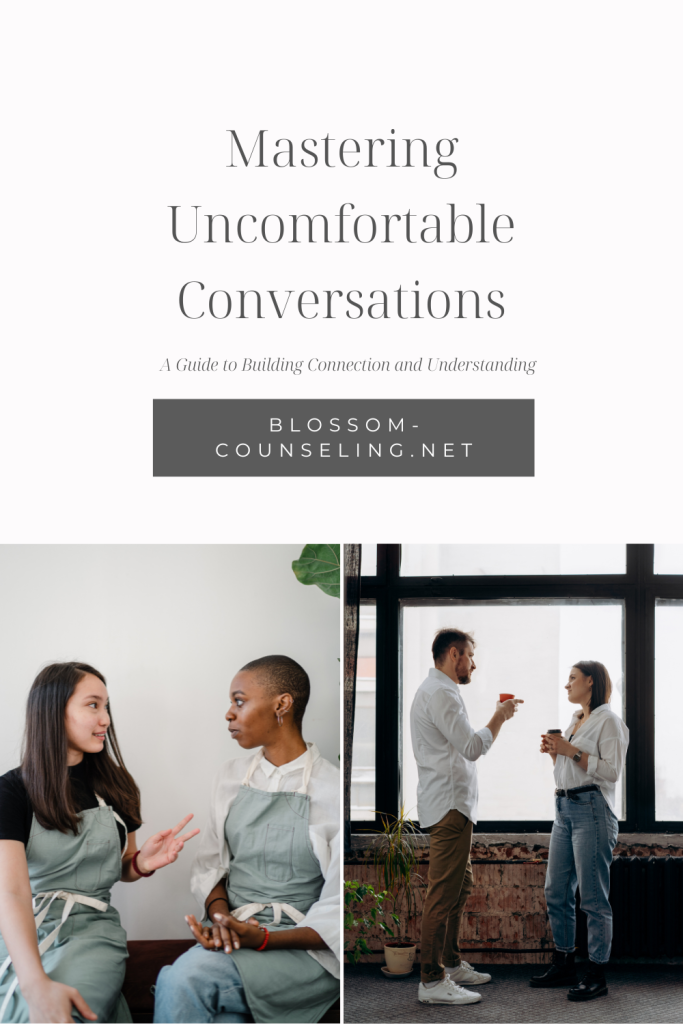
Do you often find yourself saying “yes” when every fiber of your being wants to say “no”? If you’re nodding, you’re not alone—people-pleasing is a habit many of us pick up without realizing it. The urge to make everyone happy can feel like a full-time job, but it often leaves us feeling depleted, resentful, or lost in the process. If you’re trying to break free from the people-pleaser pattern, coping statements are a powerful tool to help you set boundaries without the guilt trip.
What Are Coping Statements?
Coping statements are short, affirming phrases that remind you of your worth and help you stay grounded when your instinct is to please others at your own expense. Think of them as mental “pause” buttons that give you a moment to reflect before agreeing to something you’re not comfortable with. These statements help you reconnect with your needs and values, especially when the people-pleaser voice is screaming for approval.
Why Do We People Please?
For many of us, people-pleasing stems from a desire to avoid conflict, be liked, or gain validation. It can feel like saying “yes” is the path of least resistance, but over time, this habit eats away at our sense of self. Before we know it, we’re saying “yes” to things that don’t align with our values, interests, or capacity.
It’s easy to believe that making others happy will bring us happiness, but here’s the kicker—it rarely works. The more we prioritize others’ needs over our own, the more we drift from our true selves.
The Power of Boundaries
This is where coping statements can work magic. They serve as a buffer between you and your automatic people-pleasing tendencies. When used consistently, these statements allow you to practice setting boundaries and, ultimately, build up your confidence in honoring your own needs.
Imagine being at a social gathering and someone asks you for a favor that you really don’t have time for. Instead of feeling like you must agree to maintain harmony, you can rely on a prepared coping statement to navigate the situation with grace.
Coping Statements for People Pleasers
Here are a few coping statements to try out when you feel the urge to say “yes” but your gut is pulling you in the opposite direction:
- “It’s okay to say no.”
Simple but effective. It reminds you that setting boundaries isn’t selfish; it’s necessary. - “I am not responsible for others’ happiness.”
A gentle reminder that it’s not your job to fix everyone else’s problems or meet their expectations. - “I deserve to take care of myself, too.”
This statement reinforces the idea that your well-being matters just as much as anyone else’s. - “I can take time to decide.”
People pleasers often feel pressured to answer immediately. Giving yourself permission to pause can be freeing. - “Discomfort doesn’t equal danger.”
Saying no or setting boundaries can feel uncomfortable, but discomfort is not the same as harm. It’s okay to sit with the unease of asserting yourself. - “I don’t need everyone to like me.”
Acceptance of this truth can feel like a weight lifting off your shoulders. It’s impossible to make everyone happy, and that’s completely okay.
Using These Statements in Real Life
Think of coping statements as your mental toolkit. The next time you’re tempted to agree to something you don’t want to do, repeat one of these phrases to yourself. It may feel awkward at first, but over time, these statements will start to shift your thinking. Instead of reacting out of fear or guilt, you’ll begin responding from a place of self-respect and authenticity.
Incorporating these coping statements into your daily life won’t transform your habits overnight, but they will help you gradually reclaim your voice. With practice, you’ll feel more empowered to protect your time, energy, and emotional well-being—without losing your compassionate, thoughtful nature.
People-pleasing doesn’t have to define you. You can care for others without sacrificing yourself in the process. Learning to say no (or “not now”) is one of the most freeing things you can do for your mental health. And the beauty of it? Those who truly care about you will respect your boundaries, and you’ll find deeper connections with the people who matter most.
Our team of compassionate therapists is here to help you find the support you need. We believe in a holistic approach, treating your mind, body, and spirit. With a blend of traditional and alternative therapies, we tailor your experience to meet your unique needs. At Blossom, we create a non-judgmental space where you can be your authentic self. Our goal is to empower you, amplify your strengths, and help you create lasting change. Together, we’ll navigate life’s challenges and help you bloom, grow, blossom! You deserve to become the best version of you.




